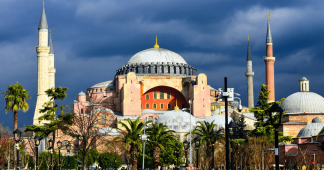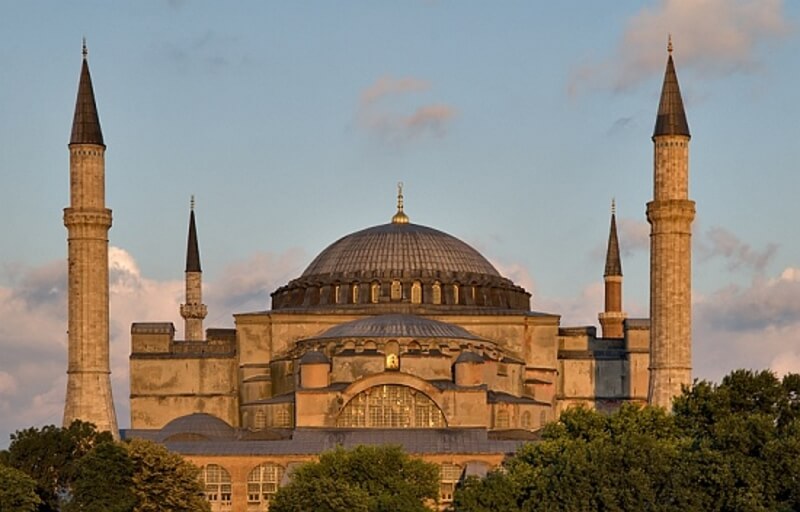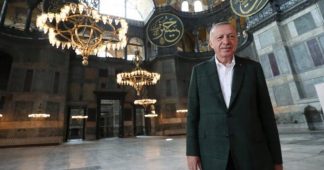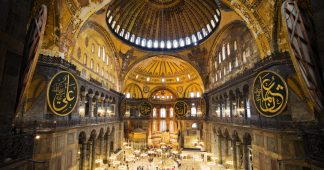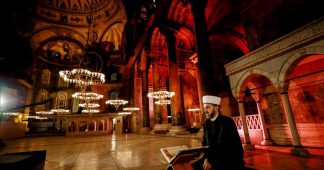Head of the Greek Orthodox Church in the US Archbishop Elpidophoros, who is spearheading the event, said it is “deeply gratifying” to see the response from Catholics and other Christian sects, as well as different religious groups.
“Many ecumenical and indeed interfaith partners will join us tomorrow, and in a grass roots way, because they see that [Erdogan’s] decision is heading in the wrong direction for humanity. We will pray, not condemn. We will join together, not divide,” said Archbishop Elpidophoros in an interview with Al Arabiya English on Thursday.
“We will bear witness to a better way to live as the human family, where memories of conquest and empire are relegated to where they belong: the past,” he added.
Elpidophoros and Roman Catholic Cardinal Timothy Dolan of New York issued a joint statement on June 15 calling for the Hagia Sophia to remain a symbol that glorifies “the One God who has made us all be sisters and brothers of one human family.”
Elpidophoros, a Turkish citizen who grew up in Istanbul, said there is a “longstanding trend by President Erdogan” to emphasize Turkey’s Ottoman past and that the conversion of the Hagia Sophia is the latest example.
Hagia Sophia controversy
The Hagia Sophia, located in the Turkish city of Istanbul, was originally built as a Christian cathedral in the sixth century. It was converted into a mosque nearly 1,000 years later during the Ottoman conquest of the city in 1453.
The building had operated as a museum since 1935 following the founding of the secular Turkish Republic – until this month when Erdogan announced the iconic building would be converted back to a mosque.
Erdogan’s move violates “all standards of religious harmony and mutual respect,” according to a press release by the Greek Orthodox Archdiocese of America, who urged its churches to toll their bells “in lamentation” on Friday.
The US Conference of Catholic Bishops said it would join the ‘Day of Mourning’ and would offer prayers for “the restoration of Hagia Sophia as a place of prayer and reflection for all peoples.”
Hagia Sophia significance
Hagia Sophia, a UNESCO World Heritage site, is “symbolically quite significant to all Orthodox Christians,” according to Robert Nelson, a professor at Yale University.
The monument houses Christian mosaics and frescoes from its days as a cathedral – artwork that will now be covered during religious services.
According to Nelson, Christian Byzantine heritage is “systematically repressed” in Turkey.
Three other famous Christian churches in Turkey have also been converted into mosques in recent years: the Hagia Sophia cathedral in Iznik, the Hagia Sophia Church in Trabzon, and the Church of Chora in Istanbul.
Erdgon motivated by politics
According to experts, President Erdogan’s decision to change the Hagia Sophia’s museum status is solely for political purposes.
“The Turkish president hopes that Hagia Sophia’s conversion will create a rally-round-the-flag effect and provide him with some legitimacy,” said Aykan Erdemir, who is senior director of the Turkey Program at the US thinktank Foundation for the Defense of Democracies, in an interview with Al Arabiya English.
Erdemir said Erdogan’s policies have led to the worst economic crisis in Turkish history, which is causing even die-hard supporters to question their loyalties to the president.
Although Erdogan is not up for re-election until 2023, his political opponents have recently threatened his hold on power. Last month former Turkish Prime Minister Ahmet Davutoglu said he was ready to cooperate with opposition parties to stand against Erdogan’s ruling Justice and Development Party (AKP).
Since then, Erdogan ordered the shutdown of Sehir University in Istanbul, whose founders included Davutoglu.
Erdogan is now feeling threatened by increasing opposition to him, according to Henri Barkey, a fellow for Middle East studies at the Council on Foreign Relations.
Yale University Professor Robert Nelson told Al Arabiya English the conversion of the Hagia Sophia and other historical churches in the country into mosques is part of the Turkish president’s playbook to win public support.
